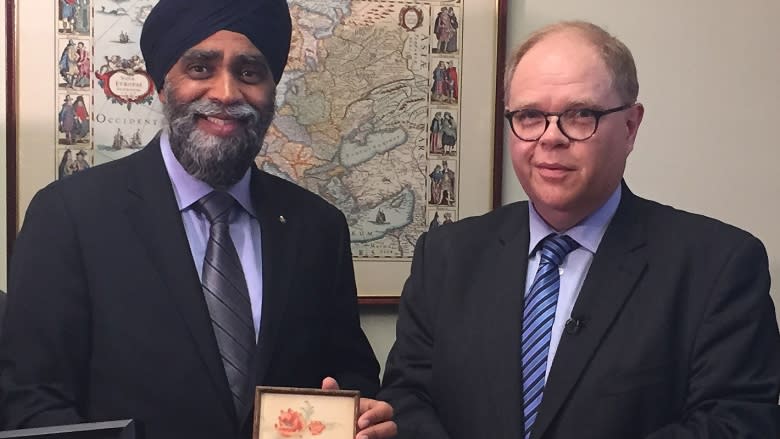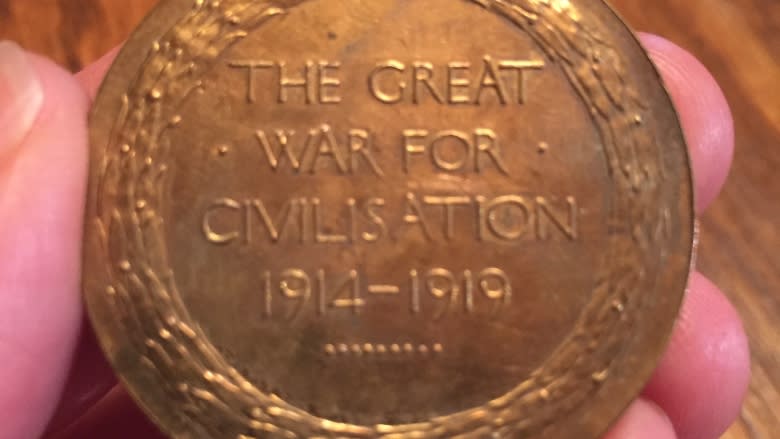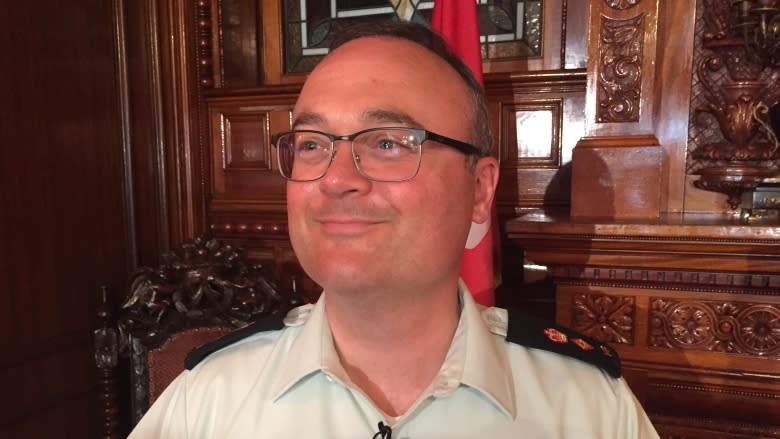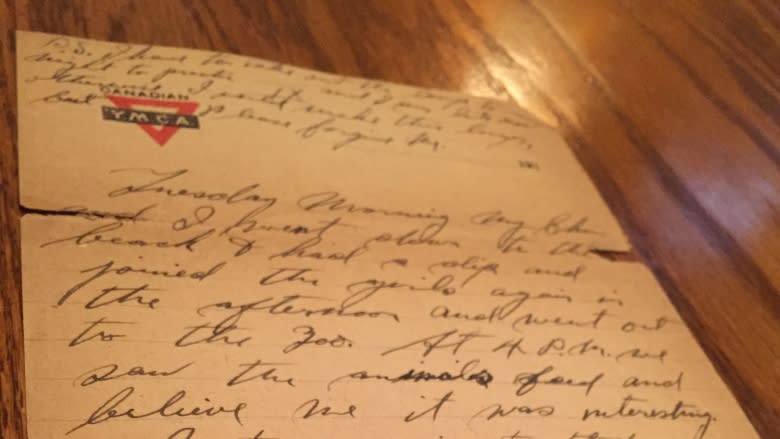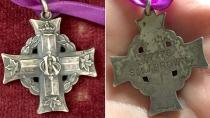Meet Kevin McCormick, the man who made it his mission to return Canada's lost military medals
While their achievements in uniform can be found on their service records, the military medals that mark the deeds of Canada's men and women are sometimes lost as the decades roll one over the other.
One Canadian, however, has dedicated himself to finding those tangible markers that had gone missing and returning them home.
Kevin McCormick, president of Huntington University in Sudbury and an honorary lieutenant-colonel in the Irish Regiment, has made it a personal mission to see military medals and other artifacts restored to their rightful owners.
McCormick's latest effort saw him Monday give Defence Minister Harjit Sajjan the Memorial Cross that was awarded to a grieving mother 100 years ago after she lost a son at the battle of the Somme.
"You bring a sense of closure to people," Sajjan told McCormick in a private event held on Parliament Hill, "especially when it comes to the Memorial Cross.
"Family members have given the ultimate sacrifice to us, [which] makes it so important. And even if they can't be found, it's actually explaining it to other people, 'hey this was a sacrifice.'"
McCormick is adamant that he is not a collector. It's an odd assessment from a man who devotes much of his time and money to finding and buying Canadian military artifacts.
"I took to searching and finding through auction sites and online opportunities, artifacts, letters and medals and other personal items of soldiers who have given their life in service of our country, and then [finding] a way to relocate those items with an appropriate home," McCormick said.
He calls it Project Honour and Preserve. Over the past four years, McCormick has acquired more than 100 items, mounted them in shadow boxes and brought them home.
"I've returned medals to families, and I've placed medals in regimental museums that may be worth a lot more to a collector. But their intrinsic value to the family member or to the museum from where he or she came … it transcends a monetary value," he said.
He added that he doesn't care how the items ended up on the market in the first place.
You can't 'put a price on sacrifice'
Among the dozens of honours McCormick has purchased are a Conspicuous Gallantry Medal, Distinguished Service Cross and a medal for an Officer of the Order of the British Empire.
He has also acquired personal items such as trench art, telegraphs and journals.
McCormick paid for every item out of his own pocket.
"I'm often asked what I pay for something, and I never get into what I pay," he said. "It's all personal. It's all my own money and my own resources. I don't think you can put a price on sacrifice."
Sometimes finding the right home for the artifacts is a tough slog, such as the Memorial Cross presented to Sajjan. It originally belonged to the mother of a Sgt. John Brown who served with the Central Ontario Regiment, 20th Battalion and who died Oct. 1, 1916.
McCormick believes he died at Ancre, France, and has yet to find one of Brown's relatives or decendants to claim the medal.
When he hits such a wall, McCormick calls a friend with the police — the military police.
Letters home from Eli
Library and Archives Canada has been "a critical place for research," says Lt.-Col. Mike Motyl.
"At times, we've done some searching within our databases to find out if we have any records, and in some cases we may find a fingerprint record or something like that."
Motyl is currently trying to crack the very cold case of prolific and passionate letter-writer named Eli who served as a gunner during the First World War.
"Tonight darling, I feel very lonely and 'oh' to be with you, to tell you everything instead of writing it," Eli wrote in one letter.
"I have gone into every every detail, so haven't had much space for LOVE, but will tell you more of that Sunday when I will write you again. Your own true sweetheart Eli."
Working alongside Motyl is Lindsay Frei, a civilian employee from the Department of National Defence who has a passion for history.
"It's incredible. We have medals, we have photos, we have love letters. We have first person accounts of what it was like to fight in the First World War in France," said Frei, as she gingerly handled an old photograph of Eli's sweetheart and future wife Inez.
"He's a joker. He's got a really great sense of humour. His wife is equally to the task. They had a love. That's what's come through this, that they had a lot of love. There's not difference, I find, between letters between soldiers today writing home versus a hundred years ago."
Motyl and Frei have learned that Eli enlisted in the Canadian Expeditionary Force in Saint John, N.B., in 1917. An old photo album with fragile black pages holds dozens of photos and negatives pictures, including one of his training camp at Valcartier, Que.
There are also journals describing his days in the trenches. Correspondence with friends and family fill five binders. In letters to Inez, Eli often signed off with "your own true sweetheart" followed by a bunch of stars to communicate hugs or kisses.
McCormick has confidence Motyl will come through again with the name of a distant relative.
"Those are sacred texts in many ways, and you don't want them just floating around. You want them to go to the right individuals who can respect and honour them," he said.

